Genres
Science Fiction is about possibilities.
As such, there is a vast richness of story lines covering everything from alternate histories to far-flung futuristic empires. It may deal with aspects of the mind or of unique technologies. It may deal with alien contact or the mortality of the human race. Or, it may deal with a combination of several such possibilities.
The following, in no particular order, are some of the genres used to classify many of the major areas covered by Science Fiction. (Caveat: This list is by no means complete, and many books or films may "mix and match" genres.)
- Hard Science
- Soft Science
- Imperial
- Dystopian
- Cyberpunk
- Steampunk
- Alternate Histories
- Apocalyptic
- Militaristic
- Space Opera
- Time Travel
- Fantasy
- Erotica / Slash
Genre Explanations
Hard Science
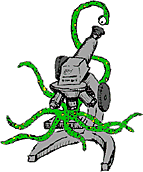
Hard Science Fiction derives its name from the rigid, logical use of science and technology within the scope of the story. The author typically takes what is best known in modern day physics or biology (at the time of the composition) and extrapolates some property to create a believable technology. While later breakthroughs may eventually reveal inaccuracies in the science, the fun of this genre usually is in believing that what the author envisions could come true.
Examples
- Ringworld - Larry Niven - Novel
- Mars - Ben Bova - Novel
- Gattaca - Andrew Niccol (Writer/Director) - Film
- Blade Runner - Philip K. Dick (Adapted from his novel, Do Androids Dream of Electric Sheep?) - Film
Soft Science

Like its name implies, Soft Science Fiction typically focuses more on the "softer" sciences of sociology, psychology, etc., or on society in general. Oftentimes it focuses on the exploits of a central character without any attempt to explain the technologies he or she uses. In actuality Soft Science Fiction is a rather ambiguous term that sometimes groups together many stories which fail the "hard science" test. There is no hard and fast litmus test that puts a novel in one category and another novel in the other; there is quite a bit of gray area between Hard and Soft Science Fiction.
Examples
- Crystal Singer - Anne McCaffrey - Novel
- Hitchhiker's Guide to the Galaxy - Douglas Adams - Novel and Film
- David Starr, Space Ranger - Isaac Asimov - Novel
- Farscape - Rockne S. O'Bannon (Creator/Authored majority of the episodes) - Television Series
Imperial
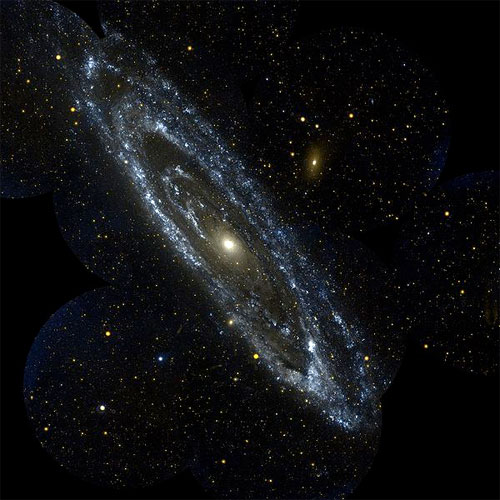
Imperial Science Fiction typically consists of some political intrigue of some far-flung empire that is ruled by a central government. Naturally, to rule such an expansive domain, some physical laws are bent in the process, most notably the ability to travel faster than light. Sometimes an ansible device is introduced to allow instantaneous communications over stellar distances.
Not withstanding the physical shortcomings, galactic empire sagas can be as intriguing and varied as the purported number of subjugant planets. These stories may consist of the establishment of an empire or "federation" through conquest or diplomacy, or they may represent the deterioration of a top-heavy, unwieldy bureaucracy that is long past its glory days. Probably the most vivid imagery of the latter is found in Isaac Asimov's Foundation series with his depiction of the planet, Trantor, the government hub of an empire long past its prime:
"Its urbanization, progressing steadily, had finally reached the ultimate. All the land surface of Trantor; 75,000,000 square miles in extent, was a single city. The population, at its height, was well in excess of forty billions. This enormous population was devoted almost entirely to the administrative necessities of Empire, and found themselves all too few for the complications of the task."
Examples
- Foundation - Isaac Asimov - Novel (Series)
- Star Trek - Gene Roddenberry - TV Series, et al.
- The Van Rijn Method - Poul Anderson - Novel (First book of the Technic Civilization saga series)
- The Mote in God's Eye - Jerry Pournelle (with Larry Niven) - Novel (Major book in the CoDominium series)
Dystopian
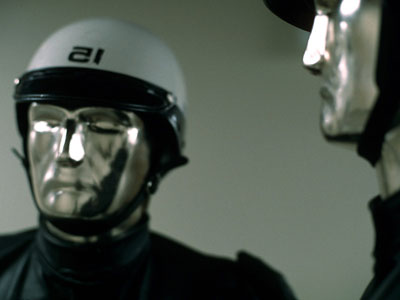
Dystopian Science Fiction frequently deals with a setting of abject poverty or an oppressive government. Sometimes it is taken at a glimpse of a dark future that could happen if humanity does not take corrective measures for some glaring social sin. The archetypal plot focuses on a central character who has committed a minor violation against the state that escalates until the protagonist unwillingly finds himself outside the system. From this exaggerated perspective, the author will commonly make observations about flaws in modern society.
Examples
- Nineteen Eighty-Four - George Orwell - Novel/Film(s)
- Fahrenheit 451 - Ray Bradbury - Novel/Film
- Brazil - Terry Gilliam, Tom Stoppard, and Charles McKeown - Film
- Ultraviolet - Kurt Wimmer - Film
- THX 1138 - George Lucas and Walter Murch - Film
Cyberpunk
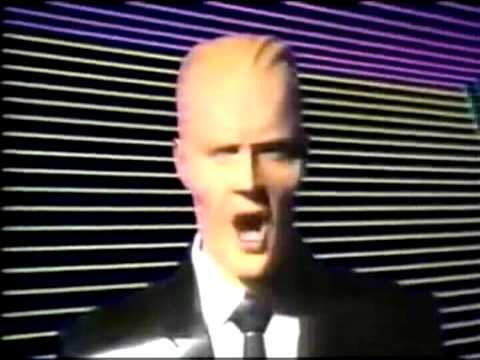
Cyberpunk Science Fiction is a name given to stories that blend cybernetics and punk. Typically the central character is younger, yet über-skilled with technology. He or she may also be a bit of an outcast or criminal, making the protagonist a kind of anti-hero. The settings are commonly dark and dystopian, so there is usually extensive crossover of this genre with Dystopian Science Fiction.
Examples
- Neuromancer - William Gibson - Novel
- Snow Crash - Neal Stephenson - Novel
- Akira - Katsuhiro Otomo - Manga/Film (Anime)
- Dark Angel - James Cameron and Charles H. Eglee (Shared Creator/Author credits for majority of the episodes) - TV Series
Steam Punk

Steam Punk generally deals with a specific type of Alternate History Science Fiction that focuses on the use of steam power of the type that was available during the early industrial revolution era to create modern-like technologies. Given that breakthrough technologies such as this would have greatly changed the course history, there is quite a bit of overlap with Alternative History Science Fiction. One plot device sometimes used to prevent the change of history is to have the technology become lost somehow, either through accident or purposeful destruction.
Examples
- A Connecticut Yankee in King Arthur's Court - Mark Twain - Novel/Film(s)
- The Difference Engine - William Gibson and Bruce Sterling - Novel
- Steamboy - Sadayuki Murai and Katsuhiro Otomo - Film (Anime)
- The Wild Wild West - Michael Garrison (Creator/Authored majority of the episodes) - TV Series/Film
Alternate Histories
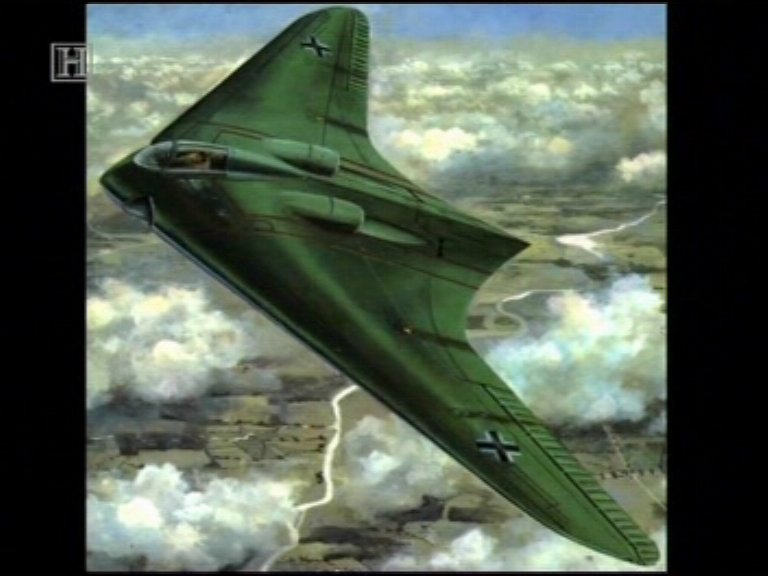
Closely related to Steampunk and Time Travel is Alternative History. Also, this branch of Science Fiction may forego science and technology altogether and only focus on the what if scenario. The common thread in this class of stories is that some major event in history has been altered, for example an assassination of Hitler before he came to power or the South winning the American Civil War. From there events are extrapolated, thus creating an imaginative look at a world that could have been.
Examples
- The Dragon's Nine Sons - Chris Roberson - Novel
- The Plot Against America - Philip Roth - Novel
- The Invention of Lying - Ricky Gervais and Matthew Robinson - Film
- Inglourious Basterds - Quentin Tarantino - Film
- The Years of Rice and Salt - Kim Stanley Robinson - Novel
Apocalyptic
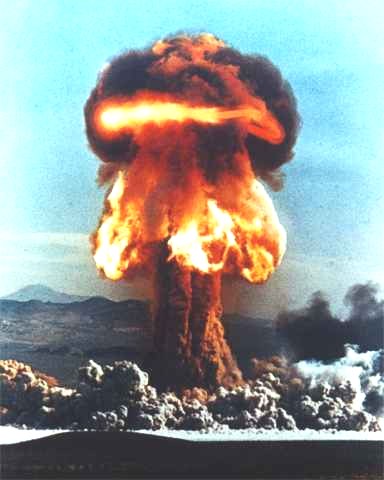
Apocalyptic and Post-Apocalyptic Science Fiction focuses on the end of humanity or on the survivors of a cataclysmic event that destroys the majority of the human race. This type of fiction gained popularity after the invention of nuclear weapons made it possible for humanity to be able to destroy itself at the push of a button. Nuclear self-destruction isn't the only vehicle of cataclysm, though. Authors have explored many subjects, including plague, alien invasion, economic collapse, and even genetic evolutinary triggers.
Examples
- Mad Max - George Miller and Byron Kennedy - Film
- Lucifer's Hammer - Larry Niven and Jerry Pournelle - Novel
- 2012 - Roland Emmerich and Harald Kloser - Film
- On The Beach - Nevil Shute - Novel/Film
- The War of the Worlds - H. G. Wells - Novel/Film(s)
- I Am Legend - Richard Matheson - Novel/Film
Militaristic
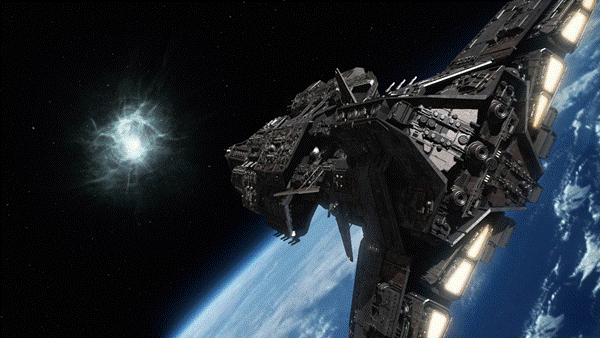
Military Science Fiction revolves around central characters who are involved in armed conflict. Typically some sort of military organization with rigid rules or codes is involved or implied: a space navy, a mobile infantry, space marines, etc. Most often Military Science Fiction depicts the human race in conflict with an evil or misunderstood alien race, but sometimes, as in Jerry Pournelle's The Mercenary, the human race is battling itself for supremacy.
Examples
- The Forever War - Joe Haldeman - Novel
- Starship Troopers - Robert Heinlein - Novel
- Enemy Mine - Barry B. Longyear - Novella/Film
- Battlestar Galactica - Glen A. Larson (Creator/Authored majority of the episodes from 1978-1979) - TV Series
- The Last Starfighter - Jonathan R. Beteul - Film
Space Opera
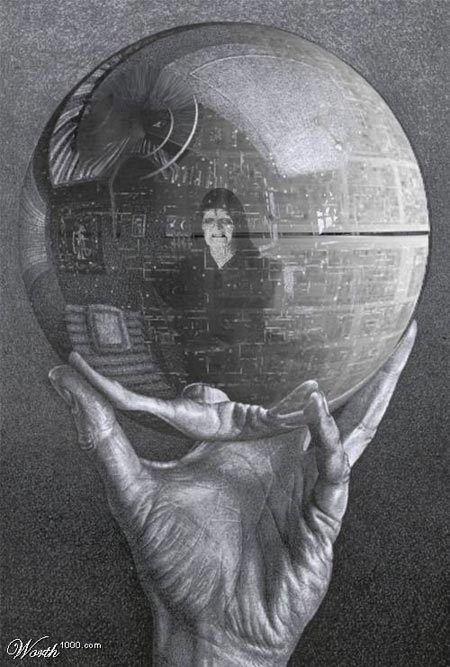
Space Opera is a general term, sometimes overly generic, to describe grandiose adventures, larger-than-life characters, and epic scale plot lines. A typical Space Opera plot may revolve around a central character, or small group of characters, who fight against impossible odds to eventually accomplish, or fail brilliantly, at their designated mission.
Without a hard definition, the quandary of the Space Opera designation is the overlap of so many other Science Fiction genres. Also, sometimes this moniker is used to denigrate Science Fiction in general as clichéd or hackneyed. However, if one looks close enough, a wealth of entertaining and worthwhile stories can be discovered within this genre — despite the unfortunate naming convention.
Examples
- Star Wars - George Lucas - Film (Series)
- Dune - Frank Herbert - Novel/Film(s)
- Saga of Seven Suns - Kevin J. Anderson - Novel (Series)
- Babylon 5 - J. Michael Straczynski (Creator/Authored majority of the episodes) - TV Series
- Firefly - Joss Whedon (Creator/Authored majority of the episodes) - TV Series
Time Travel
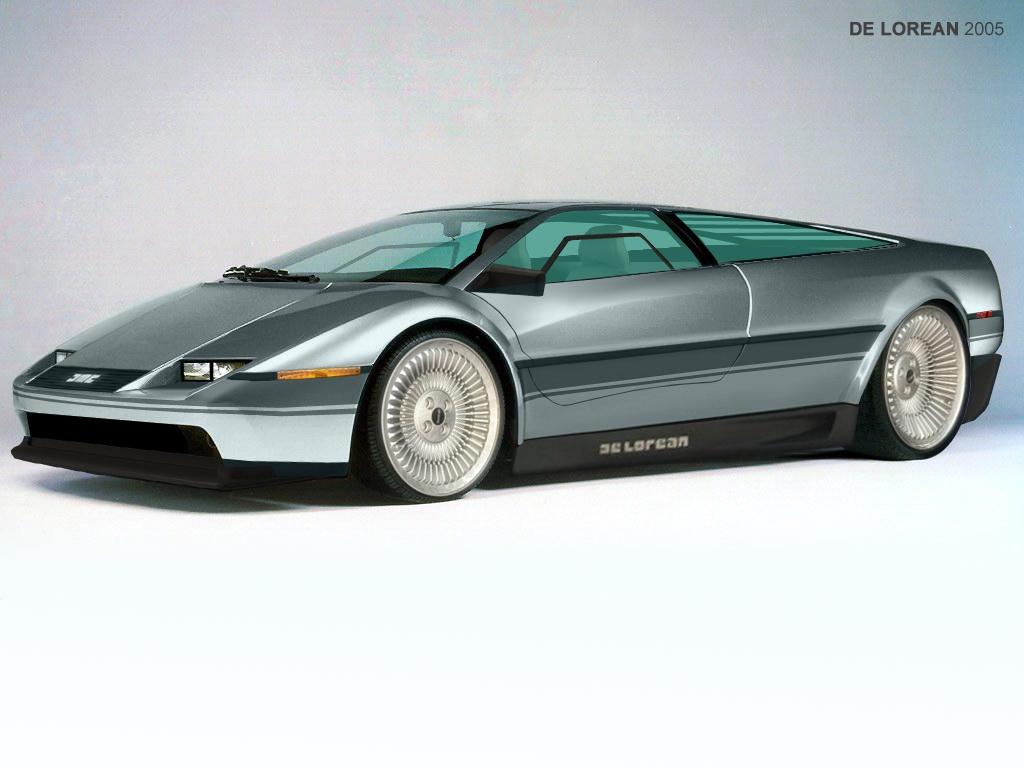
Though fraught with paradoxes and violations of the known laws of physics, Time Travel in Science Fiction has been and continues to be wildly popular. Many major authors have written at least one short story or novel involving Time Travel at some point in their career. One common plot theme in the more popular stories may involve a central character who actually must fix a historical event to restore a broken timeline. Naturally, failure to do so would have disastrous consequences for the protagonist.
Examples
- Back to the Future - Robert Zemeckis and Bob Gale - Film
- Time Traveler's Wife - Audrey Niffenegger - Novel/Film
- Frequency - Toby Emmerich - Film
- The Time Machine - H. G. Wells - Novel/Film(s)
- Doctor Who - Sydney Newman (Creator) - TV Series
- Quantum Leap - Donald P. Bellisario (Creator/Authored majority of the episodes) - TV Series
Fantasy
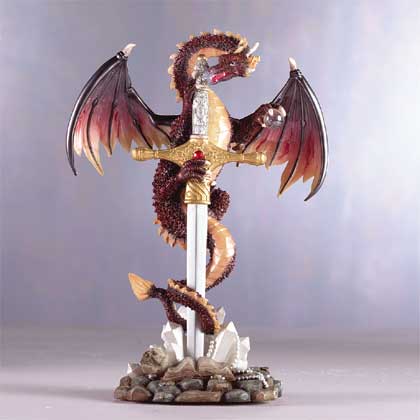
Though not Science Fiction in the truest sense, Fantasy stories are sometimes grouped with Science Fiction because of their similarities in creating imaginative universes. Though this site is dedicated mainly to works of Science Fiction, to not mention Fantasy would be remiss on our part.
Fantasy stories are usually epic in proportion and consists of mythical creatures and magic powers. A common theme involves a main character, who though naive at first, must learn how to battle dark forces attempting to deter the protagonist's progress during a quest or other adventure of discovery.
Some authors may combine elements from both the Fantasy genre and the Science Fiction genre. Anne McCaffrey's Dragonriders of Pern saga is a notable example of such a crossover. In her novels, she creates a lost colony world where specialists have learned to bond with and to fly native creatures (dragons) while the colonists as a whole attempt to rediscover their roots.
Examples
- The Lord of the Rings - J. R. R. Tolkien - Novel/Film (Series)
- The Wheel of Time - Robert Jordan - Novel (Series)
- Dragonriders of Pern - Anne McCaffrey - Novel (Series)
- Harry Potter - J. K. Rowling - Novel/Film (Series)
Erotica / Slash
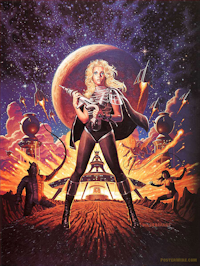
This sometimes controversial genre of Science Fiction erotica has been around almost as long as there's been Science Fiction. Frequently combined with Fantasy, Erotica brings a sensuality to what is sometimes an overly-technical and sterile environment. More commonly though, Erotica has been relegated to the B-movie category.
A popular sub-category of Erotica is "Slash Fiction". In its typical incarnation, it is fan-fiction where two unlikely characters engage in romantic liaisons. The term "Slash" derives from the original Star Trek fan-fiction where the sometimes humorous pairing was "Kirk / Spock" (pronounced "Kirk Slash Spock"). These days, the "slash" doesn't necessarily imply gay overtones, and may even include "triplings" (eg, Rory / Amy / The Doctor).
Examples
- Cat-Women of the Moon - Roy Hamilton - Film
- Devil Girl from Mars - James Eastwood and John C. Maher - Film
- Fire Maidens From Outer Space - Cy Roth - Film

